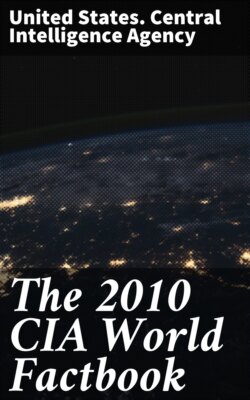Читать книгу The 2010 CIA World Factbook - United States. Central Intelligence Agency - Страница 413
На сайте Литреса книга снята с продажи.
NA
ОглавлениеElectricity - production:
848.5 kWh (2005) country comparison to the world: 214
Exports:
$876 million (2008 est.) country comparison to the world: 154 note: excludes oil
Exports - commodities:
petroleum products
Exports - partners:
US 13.1%, Guatemala 10.8%, Singapore 10.7%, Dominican Republic 9.6%,
Haiti 7.6%, The Bahamas 6.1%, Honduras 4.5%, Mexico 4.2% (2009 est.)
Imports:
$1.34 billion (2008 est.) country comparison to the world: 165
Imports - commodities:
crude petroleum, food, manufactures
Imports - partners:
Venezuela 57.3%, US 19.2%, Brazil 8.1% (2009 est.)
Exchange rates:
Netherlands Antillean guilders (ANG) per US dollar - 1.79 (2009), 1.79 (2008), 1.79 (2007), 1.79 (2006)
Transportation ::Curacao
Airports:
1 country comparison to the world: 231
Airports - with paved runways:
total: 1
over 3,047 m: 1 (2010)
Roadways:
total: 550 km country comparison to the world: 191
Ports and terminals:
Bullen Baai, Fuik Bay, Willemstad
Military ::Curacao
Military branches:
the Royal Netherlands Navy maintains a permanent and active presence in the region from its main operating base on Curacao; other local security forces include a coast guard, para-military National Guard (Vrijwilligers Korps Curacao), and Police Force (2010)
Military service age and obligation:
no conscription (2010)
Military - note:
defense is the responsibility of the Kingdom of the Netherlands
page last updated on January 19, 2011
======================================================================
@Cyprus (Europe)
Introduction ::Cyprus
Background:
A former British colony, Cyprus became independent in 1960 following years of resistance to British rule. Tensions between the Greek Cypriot majority and Turkish Cypriot minority came to a head in December 1963, when violence broke out in the capital of Nicosia. Despite the deployment of UN peacekeepers in 1964, sporadic intercommunal violence continued forcing most Turkish Cypriots into enclaves throughout the island. In 1974, a Greek Government-sponsored attempt to seize control of Cyprus was met by military intervention from Turkey, which soon controlled more than a third of the island. In 1983, the Turkish Cypriot-occupied area declared itself the "Turkish Republic of Northern Cyprus" ("TRNC"), but it is recognized only by Turkey. The election of a new Cypriot president in 2008 served as the impetus for the UN to encourage both the Turkish and Cypriot Governments to reopen unification negotiations. In September 2008, the leaders of the Greek Cypriot and Turkish Cypriot communities started negotiations under UN auspices aimed at reuniting the divided island. The entire island entered the EU on 1 May 2004, although the EU acquis - the body of common rights and obligations - applies only to the areas under the internationally recognized government, and is suspended in the areas administered by Turkish Cypriots. However, individual Turkish Cypriots able to document their eligibility for Republic of Cyprus citizenship legally enjoy the same rights accorded to other citizens of European Union states.
Geography ::Cyprus
Location:
Middle East, island in the Mediterranean Sea, south of Turkey
Geographic coordinates:
